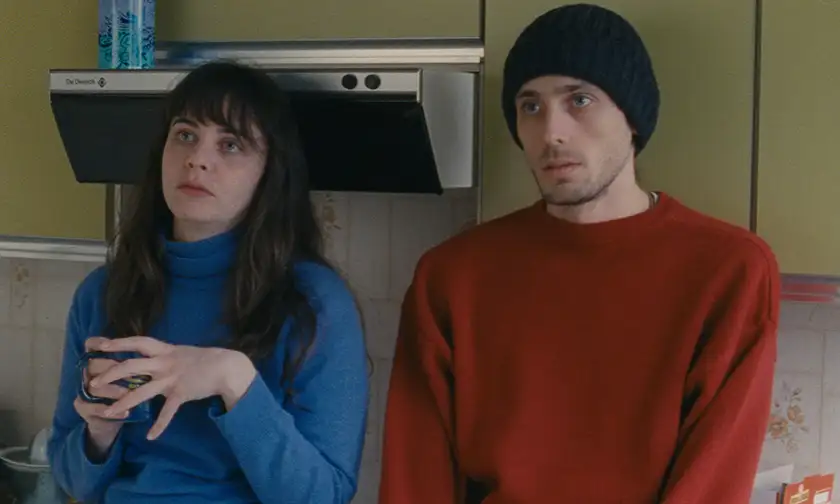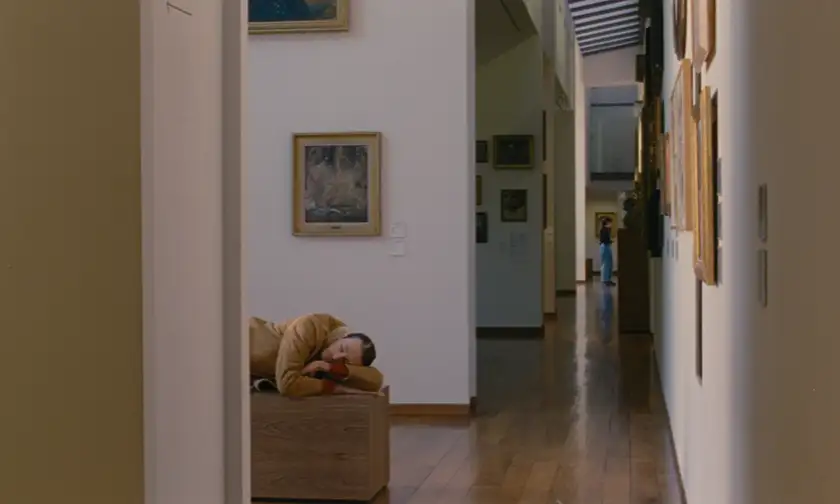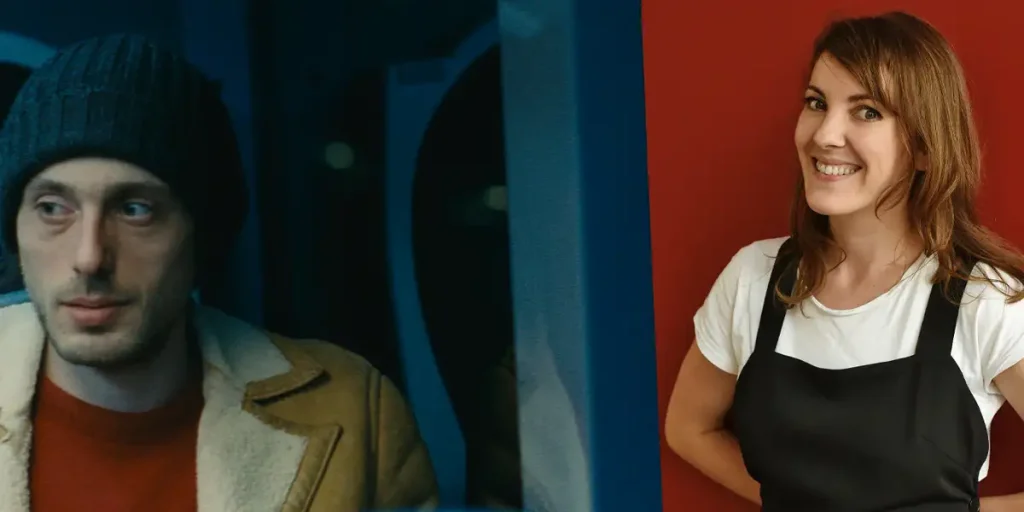At the Berlin Film Festival, we interview Léonor Serraille, writer-director of Ari, about working with actors, empathy, and how the film came together.
Léonor Serraille’s new feature film, Ari, premiered in competition at this year’s Berlin Film Festival. The writer-director takes us on a gentle journey with the young protagonist, who carries the name of the movie, as he quits his job as a teacher and is left stranded in the city after his disappointed father kicks him out of the house. For the rest of this calm and contained coming-of-age drama’s runtime, we follow along as Ari (Andranic Manet) finds his way back to old friends he had fallen out with and people he had distanced himself from.
Ari is a dialogue-heavy, naturalistic portrait of a young adult’s life, filled with scattered moments of loneliness, intimacy, and aimless wandering. We bear witness to an authentically crafted lead character, who unapologetically wears his heart on his sleeve but is still trying to lead a more meaningful existence as he wrestles with the complicated transition into fatherhood. Léonor Serraille zeroes in on the compassionate and vulnerable souls that shape her story and completely surrenders the script to the actors – the pillars that hold its emotional core together.
At the Berlin Film Festival, we sat down with Léonor Serraille to discuss her creatively fluid and collaborative process, which resulted in the compelling and heartwarming story of Ari. We speak about the improvisational way the script came together, finding the perfect fit for Ari, detaching from limiting ideas of masculinity, approaching with sensitivity, and more. Read the interview below!
Léonor Serraille on the Cast of Ari and Improvising Their Way Into the Story
Let’s start with the writing process. When did the seed of the idea begin to grow in your mind, and how did it develop into what Ari is now?
Léonor Serraille: I felt like making a movie about teachers, as I have two young kids. I was interested in primary, kindergarten, and primary school teachers, particularly young teachers, whom I felt were having a difficult time.
I knew I was going to make a film with the actors of the National Academy of Dramatic Arts in Paris. I started having conversations with all of them before I even started writing the script, and we had this very open conversation about life, the world, their dreams, and how they projected themselves in the future. I knew I didn’t want to do a choral movie; I was more interested in working on one single character. I thought it would be quite interesting to focus on a wandering character who could be, in some ways, my alter ego, because I did feel a little isolated and alone at the time. Once I came back to the conversations I had with the actors and all their questions, it became a continuation of that. Then, fatherhood came a bit later, just before we started shooting.

Since those conversations were the starting point for writing dialogue, was it all set in stone, or was there also flexibility on set? The dialogue scenes from friend to friend feel very authentic. They feel like real people engaging in conversation. Was there room for improvisation?
L.S.: Yeah, at each step I was looking for something that was very naturalistic, you know, very true. It was the first time I’ve actually worked like this. I did a lot of rehearsals with the actors. I was on my own, filming them, and sometimes their improvisations were just perfect; I took the words as they were, wrote them down, and put them in the script. We had this as some sort of a base, and those improvisations in rehearsal came to nurture the script.
Even during the shoot, I gave them the possibility to improvise again. They had three minutes to improvise on a specific subject, after which we would repeat and film it. I drew on everything they offered when we worked together, which made the writing very dynamic and flexible.
It’s the most important thing for me when I shoot: capturing the sensation that they are improvising, even though they’re not. I love when they leave me with the impression that they were uttering what they said for the very first time.
Léonor Serraille on Finding Ari in Andranic Manet
You’ve mentioned before that you had different actors play different roles throughout the process. When was the moment you knew that the Andranic Manet would be the one to play Ari?
Léonor Serraille: We did 13 days of rehearsal, and I was working with my casting director Youna de Peretti. We had decided that for the first 3 days, every single actor we had was going to try to be Ari. When Andranic arrived, he worked on a scene that eventually did not end up in the film, but he came in with something very sad. He was full of sorrow, and, in a way, that reminded me how much sadness and pain there was in the character. I thought it was very interesting that he dared to come with this proposal. I felt that his tears were really, really powerful. Soon after seeing him act, I knew it was him, even if we continued the process we had set.
There’s also this other scene, where the actor needed to be like a kid, when he is with this robe, and he laughs and dances to the music. He did this incredibly well too. I felt that if this actor could offer so much darkness and so much lightness and laughter, everything was going to be possible. He had this clumsiness and this elegance: he was too tall, too fragile, like the stem of a flower that balances but never breaks. He was also very pale and had this very clear gaze, so all of that together just convinced me.
Ari’s Journey Into Fatherhood
Did the script keep changing after you cast the actors?
Léonor Serraille: The script changed all the time. For example, the idea of paternity arrived four weeks before shooting. At first, the topic was only mentioned in dialogue with Ari’s father at the end of the film, when Ari goes back to his job at school, but I thought something was missing. So, I watched the interviews again, and all the young men were talking about being fathers later. It touched me a lot. And I said, “Wow, I have to do something. I have to find the glue to paste everything together.” Three weeks before the shooting, I told Andranic that fatherhood was to come into play.

About the scene where you said Andranic was in the robe and had to improvise dancing with the gardener – that was one of my favorite moments of the film. What part do you think that scene plays in Ari’s journey, and what exactly does it do for his character?
L.S.: I think Ari, in a way, found a little secret. He opened some small secret door with the discovery of his child and of his fatherhood. I could have stopped the film there, but I needed to see Ari opening up after receiving this piece of news. I needed to see him becoming a dad and becoming a child again at the same time.
We had conversations with Andranic about whether or not he had love stories with men, with women, with both. What happened with the gardener is just the very moment when he really needs a hug. He needs to be embraced. It’s a moment between two men who are a little lost, who just accept this moment of tenderness. When Ari starts dancing and when he opens up this way, it’s as if all the little gifts he had been giving to all the people around him actually come back – he’s giving and he’s receiving. We don’t know if he’s going to meet again with the gardener. Maybe not, but what has happened is that he was able to seize the present moment and accept what’s here and now, and he can just breathe and accept and enjoy what’s possible.
Léonor Serraille on Portraying Fragility and Masculinity
I’m curious about the visions Ari says he has. Was it a deliberate decision to add an ambiguity to the question of what is actually happening and what isn’t?
Léonor Serraille: While I was working on the film, I was reading “Demian” by Hermann Hesse, and I felt that the fragility of Ari gave him access to not exactly visions but dreams and a specific way to filter reality. We wanted to do something with that for the character. What I thought was really beautiful was that fragile people actually have less of a filter, and they directly touch people in the heart. I thought it was something that would be beautiful to show.
You’ve mentioned before that you wanted to write a character with a vulnerability and gentleness because we haven’t seen much of that in cinema – the lead male character who is more empathetic and soft. I wanted to bring up the aspect of masculinity: . this more different idea of what a man should behave like and what a man should be in the conflict between Ari and his father, who is more traditional, or between Ari and Jonas.Those are all men who process their emotions in different ways.
Was that ever a topic in your head while you were writing?
L.S.: Yes, of course it was, but I fear being trapped in treating masculinity. I wanted to speak about a different type of man, and I thought that cinema could also show a different kind of man, but I didn’t want to be trapped into this whirlpool of what masculinity is and what I should show or not show. I thought it was going to drive me to make bad decisions. Also, I really feel quite far away from what could be a female or a male gaze. I hope that everyone can recognize themselves in Ari.
Obviously, I drew on the men around me. For instance, my dad and my brother, who stayed a long time sharing a house together, and I always thought it was some kind of weird duet. In films, we’ve seen a lot of strong men, or at least, men shown through their strength. I think in cinema there are a thousand different ways of filming and showing that.
This interview was edited for length and clarity.
Ari (2025) premiered at the Berlin Film Festival on February 15-22, 2025. Read our review of Ari below and take a look at all our Berlin Film Festival reviews!
Header credits: A still from Ari (© Geko Films – Blue Monday Productions – ARTE France – PICTANOVO – Wrong Men – 2025) / Director Léonor Serraille (© Philippe Lebruman)

